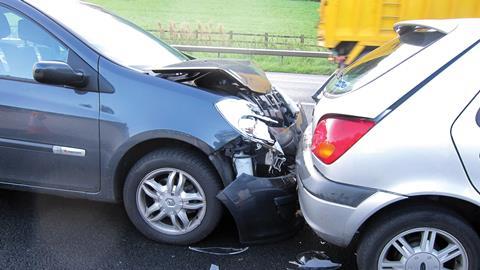Personal injury lawyers have endured years of reform seemingly designed to kill off claims supported by legal advice. And there is more to come, reports Melanie Newman
THE LOW DOWN
Back in the 1990s, some claimant PI lawyers would bill £600,000 each just for doing RTA claims. Those halcyon days have gone in the wake of a slew of reforms targeting the hotly disputed ‘compensation culture’. But has the pendulum swung too far? A concerted campaign by the defendant insurance lobby has culminated in the Civil Liability Act. Depending on which side of the fence you sit, this will either wipe out a section of the market sustained by dubious and fraudulent cases, or deprive huge numbers of genuine claimants of compensation to which they are properly entitled. Meanwhile, fears are growing that ‘dumbed-down’ claims management companies will move into the space vacated by solicitors.
Despite law’s conservative image, quite a few personal injury lawyers will be hoping for a Labour win if an election is called this autumn. Jeremy Corbyn is now claimant solicitors’ last and unlikely hope of halting the implementation of the Civil Liability Act.
Depending on who you speak to, the reforms will wipe out a section of the market built on fraudulent and exaggerated cases, dubious medical reports and generally unscrupulous behaviour from all parties on the claimant side. Or it will enrich fat-cat insurers while depriving hundreds of thousands of genuine claimants of justice and shifting the costs of their injuries on to the state.
What most interested parties can agree on is that the legal landscape is set to change dramatically in the wake of the act, which is the latest and most drastic in a long line of reforms to the way personal injury claims are handled. Concerns remain on both sides of the fence about the impact of the latest changes on access to justice.
‘Back in the 1990s some personal injury lawyers would bill £600,000 each doing road traffic accidents (RTAs), churning them out and making insane sums of money,’ says Andrew Gray, founding partner of Truth Legal in Harrogate. ‘That had to change, but we’re now at a stage where it’s almost not profitable to run personal injury cases. It certainly won’t be profitable to do low-value claims come April 2020.’
April 2020 is when the ‘whiplash reforms’ introduced by the act – affecting a range of muscle, ligament and soft tissue injuries with a prognosis of 0-24 months – come into force.
A new tariff system will dramatically reduce the amount of compensation awarded to individual whiplash victims. Injuries that are currently compensated at £2,000 upwards plus legal costs will now earn just £450 plus small claims costs.
Also coming into force are changes to small claims which set a threshold for recovery of the cost of legal advice. Those injured while inside a vehicle will no longer be able to recover costs if their claim is valued at £5,000 or less. Previously, the limit was £1,000.
During parliamentary debates on the bill, Labour MPs proposed an amendment linking increases in the limit to inflation. The amendment was defeated. Pedestrians, cyclists, horse riders and anyone else on the road, but not in a vehicle, are exempt from any limits. But for all other personal injury claims, including those covered by employers’ and public liability, the costs claim limit will be £2,000.
Gray believes claimants are likely to find these distinctions inexplicable. ‘There’s an accident and the person injured outside the car gets a lawyer and the person inside doesn’t? Where’s the justice in that?’ he asks. Similarly, an employee knocked down by a vehicle in a private yard will stand less chance of receiving representation than if the accident had occurred on the road outside the gates.
Many lawyers fear that the combined effect of a lack of legal representation, the need to pay for a medical expert on top of court fees, and a massively reduced award will deter many injured people from bringing claims.
'A MARKET IN GREAT FLUX'

A survey of 100 of the sector’s solicitors by legal marketing collective First4Lawyers found 42% had seen firm profits fall over the past year (30% said profits had increased). Some 46% said cashflow
had worsened and 40% had seen staff numbers reduce.
Almost half said the cost of doing business had increased and 13% said they expected their firm to close as a result of reforms. All predicted redundancies across the sector over the next 18 months, with most forecasting mergers. Many also expected the cost of marketing for non-RTA work, such as injuries incurred while on construction sites, to rise.
Asked about the changes slated from April 2020, 61% predicted a cull of law firms – leaving only a small number of big practices – with a new breed of claims management company becoming the dominant handlers of low-value work.
Qamar Anwar, managing director of First4Lawyers, says: ‘Our findings paint a picture of a market in great flux.’
With the help of the Motor Insurers’ Bureau, the government is setting up an online portal to help litigants in person. To date it remains unclear how claimants who lack access to the internet will be catered for. Nor is it clear whether the portal will deal with cases where insurers deny liability, or how the current system for obtaining medical evidence will be adapted for unrepresented claimants.
‘The medical expert is there for the purpose of the court,’ Gray points out. ‘Will individuals paying their own experts fully understand how those rules work? I don’t think so. I can see a lot of experts backing away from dealing with claimants directly.’
While there is likely to be a large reduction in low-value claims, there is also a risk the system will clog up with unrepresented claimants (including those with dubious claims who may previously have been deterred by lawyers) and people with minor injuries who do not appreciate that their claim now has little value.
Gray believes claims management companies (CMCs) will move into the space left behind by lawyers. The sector has already been heavily ‘dumbed down’, meaning many cases are under-compensated, and this effect ‘will be exacerbated under the new regime’, he predicts.
‘You’ve got paralegals running hundreds of files,’ Gray adds. ‘These are sausage machines. The paralegal, through no fault of their own, doesn’t know the right questions to ask, doesn’t realise the case is complicated, tells the claimant it’s straightforward and under-settles. It happens all the time.’
His firm advertises itself as a ‘switching’ service, attracting people who want to change lawyers part way through their claim. One recent client was an EU citizen who had broken his neck in a motorbike accident. He was allocated a paralegal who submitted the case through an online portal for claims under £25,000.
‘This man was potentially never going to work again,’ says Gray. ‘This was someone who didn’t have good English, working in a foreign country without any knowledge of the system – and even he realised his previous firm was doing it all wrong.’ With Truth Legal’s help the case settled for hundreds of thousands of pounds. Gray expects errors like this to multiply as smaller firms disappear or are subsumed by claims factories.
We are very worried that claimants will be under-compensated, forcing them to rely on the state for their care
Gordon Dalyell, APIL
Devon and Cornwall personal injury practice Richard Harris Solicitors specialises in accident claims. Its eponymous founding partner says he is surviving by staying small, with minimal overheads.
‘It’s difficult to plan before we know the precise detail of all the reforms but essentially the end is in sight,’ he tells the Gazette. ‘The reforms will take out the lower end of the market but the higher-end work will also go because many of those claims start out small.’ The result will be a shrinking pool of medium- to high-value cases: ‘Everyone will be chasing those and few firms will have the volume of claims to survive.’
Like Gray, he believes CMCs will ‘steam in’ to the space vacated as law firms disappear. ‘The CMCs will use low-grade staff and provide a low-grade service with no great penalty on them for doing so. Solicitors – if there are any left – won’t be able to compete.’
For the Association of Personal Injury Lawyers, a more pressing concern than the whiplash reforms is the ‘discount rate’ used to calculate more seriously injured claimants’ future losses. Between 2001 and 2017 this was set at 2.5%.
In 2017, under threat of judicial review, the lord chancellor amended the rate to -0.75%, to howls of protests from insurers. The Civil Liability Act provides for a new system of regular review, with a first decision on new rates due on 5 August.
Incoming APIL president Gordon Dalyell says: ‘We are very worried that claimants will be under-compensated, forcing them to rely on the state for their care.’ Most injured parties are risk-averse, he adds.
The government is taking claimants’ past investment behaviour into account when deciding the new rates. Some lawyers fear this will lead to a skewed perspective, as for years before 2017 claimants were forced into risky, speculative decisions as they attempted to make up the 2.5% discount by investment.

Before the Civil Liability Act, the Criminal Justice and Courts Act 2015 introduced a new tougher definition of ‘fundamental dishonesty’. As has been widely reported, if a claimant’s behaviour meets this new definition the case is thrown out with costs awarded to the insurer and potential criminal action.
‘We would be the first to say that fraudulent claimants should be rooted out and punished, but the effect of this has been chilling,’ says Gerard Stilliard, head of personal injury strategy at Thompsons. Insurers have used the threat of a fundamental dishonesty finding to frighten claimants – in particular, professionals for whom such a finding would be ruinous – away from bringing claims.
‘The striking thing about this is that it only goes in one direction,’ he says. ‘An insurer can advance a thoroughly dishonest case and at the last minute before trial they can settle the case confident that their misdeeds won’t come to light.’
The Legal Aid, Sentencing and Punishment of Offenders Act 2012 also introduced some changes unfavourable to claimants, forcing them to pay their lawyers’ success fees out of their damages. Until then, success fees had been recoverable from defendants.
An uncomfortable truth for the sector is that this change was exploited by many lawyers. A cap was set at 25% of compensation with solicitors expected to compete to offer the lowest success fee. However, rather like the introduction of university tuition fees, which were also expected to result in variable fees across the sector, almost every firm claimed the maximum allowed and little real competition emerged.
A recent landmark case, Herbert v HH Law, has now challenged that practice. A district judge found solicitors still need to undertake individual risk assessments before setting a success fee in minor RTAs. They also need to obtain ‘informed consent’ from their clients for the figure.
Deductions for success fees do not apply to trade union members so the ruling will have little impact on union firm Thompsons. Stilliard acknowledges that criticism of the way some claimant firms charge clients may be valid, but says lawyers have been forced into making deductions from damages because of the very low level of fixed costs they can now recover from defendants. ‘Jackson LJ recommended higher amounts but the government, following lobbying by the insurers, landed upon an unsustainably low figure,’ he reflects.
Mrs Herbert’s lawyer, JG Solicitors, has developed a practice focused on challenging previous deductions from damages. Founding partner James Green says he has ‘some sympathy’ with Stilliard’s argument. ‘But it was never the intention that lawyers should replenish their profits by helping themselves to clients’ damages,’ he argues.
UNDER ATTACK IN PARLIAMENT

Chris Philp, Conservative MP for Croydon South
‘Under a system of qualified one-way costs shifting, unless the respondent can prove quite a high level of intention, deceit or malfeasance, the claimant’s legal costs are borne by the respondent in any event, even if the claim is dismissed. That creates significant moral hazard, as it means that claimants can bring claims, even if those claims have relatively little merit, safe in the knowledge that they, or indeed their advisers, will never have to bear the cost of the claim... This one-way bet – this free option – that the legal system now provides is one of the reasons why there has been such an explosion in claim numbers’
Simon Clarke, Commons Treasury select committee member and Conservative MP for Middlesbrough South and East Cleveland
‘The number of road traffic accident-related personal injury claims has increased by 200,000 since 2006 – a rise of approximately 40%. That suggests to me that the incentives in the system are skewed. Insurers predict that, without reform, motor premiums could continue to rise at a rate of about 10% annually’
Rory Stewart, (then justice minister, now international development secretary)
‘As Lord Brown of Eaton-under-Heywood – the previous president of the Supreme Court – pointed out in the upper house, this country is now known throughout the world as a haven for unnecessary whiplash claims’
David Gauke, lord chancellor and justice secretary
‘Raising the small claims limit for these RTA cases to £5,000 will work to control their costs, acting as an incentive for insurers to challenge, rather than settle, those cases that they believe to be without merit. This is vital to changing the unhealthy culture that sees whiplash claims as a way to make easy cash… fraudsters are simply taking money out of the pockets of honest motorists’
HH Law had arranged an after-the-event insurance policy for Mrs Herbert with Centron Insurance at a cost of £349. HH Law argued that was a client disbursement rather than a solicitor’s disbursement. While the first instance court disagreed, this was overturned at appeal, meaning the cost of the premium could not be challenged by Mrs Herbert via an assessment under section 70 of the Solicitors Act 1974.
However ATE premiums may yet emerge as a point of challenge in future cases.
Mrs Herbert was told no commission had been charged for arranging her policy, while evidence suggests firms have received commissions on ATE insurance in other cases.
HH Law’s latest accounts refer to a related company, Wentworth Miller, which is owned and run by HH Law’s two partners. Wentworth Miller went into administration, then liquidation after being presented with an ‘accelerated notice’ by HMRC demanding payment of almost £3m.
Documents filed at Companies House show administrators were told Wentworth Miller acted as a broker on behalf of Gibraltar-based Lamp Insurance Ltd and that it was owed more than £80,000 from Lamp in unpaid ATE insurance commissions.
In the event the administrators recovered ATE commissions worth £44,772, but the £80,000 owed by Lamp proved out of reach. In May 2019 Lamp went into liquidation.

There is no suggestion of wrongdoing by HH Law in relation to these commissions, but the case illustrates the possible sums involved if a future case opens up ATE insurance premiums – and commissions – to assessment.
Green believes some firms may be overcharging for premiums, or failing to inform customers that the cost includes a commission. These commissions may be recoverable, he maintains.
‘Many solicitors in the low-value PI market insist on ATE premiums being incepted on every single case, and have done since 2013,’ Green tells the Gazette. ‘Given some firms deal with hundreds of thousands of low-value RTA claims a year, total commissions could run into the tens of millions.’
In its 2019 review of the LASPO reforms, which ended recovery of ATE premiums from defendants, the Ministry of Justice lent some support to this view. It said it had received evidence ‘which appears to document the overcharging of PI clients for ATE premiums by PI solicitors for straightforward RTA cases’.
The review said ‘examples were given of policies being incepted on behalf of clients without a fair market analysis such that the client is charged a premium that is substantially higher than it would have been had the client purchased it directly from the insurance provider or from another cheaper insurer’.
As PPI claims dry up, CMCs may soon be moving into a new, PI-focused satellite litigation market. That is one more headache for long-suffering claimant lawyers.
Melanie Newman is a freelance journalist




























1 Reader's comment